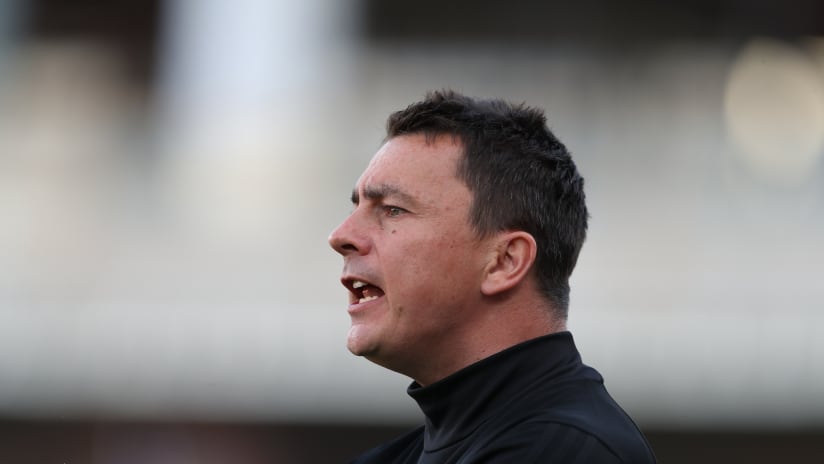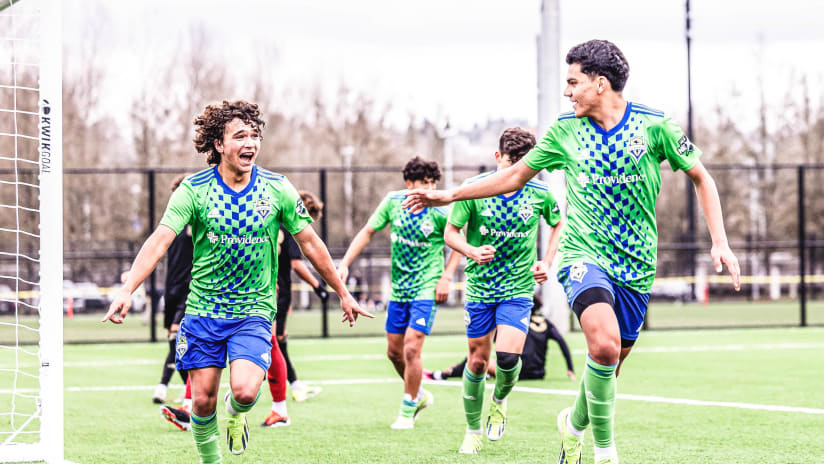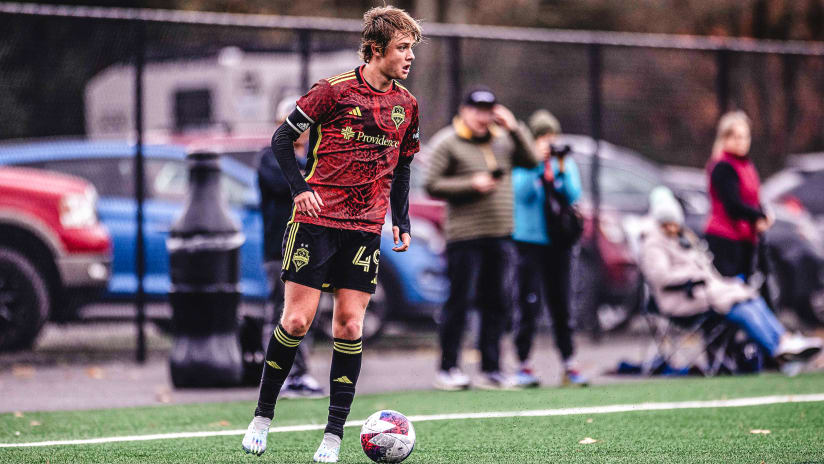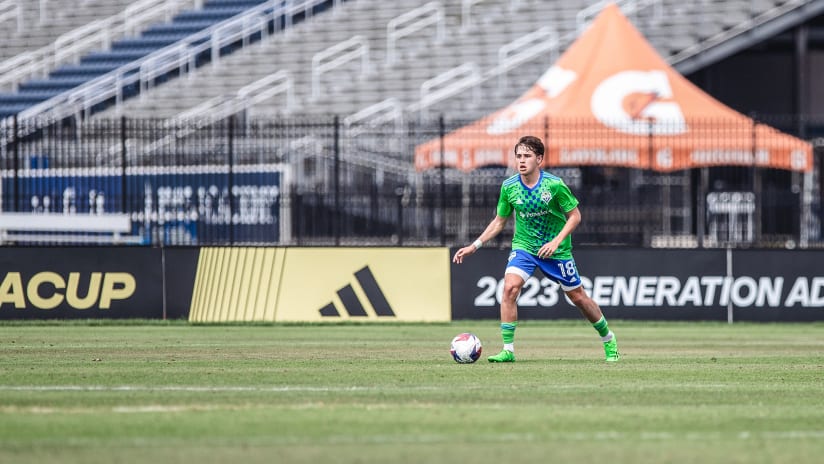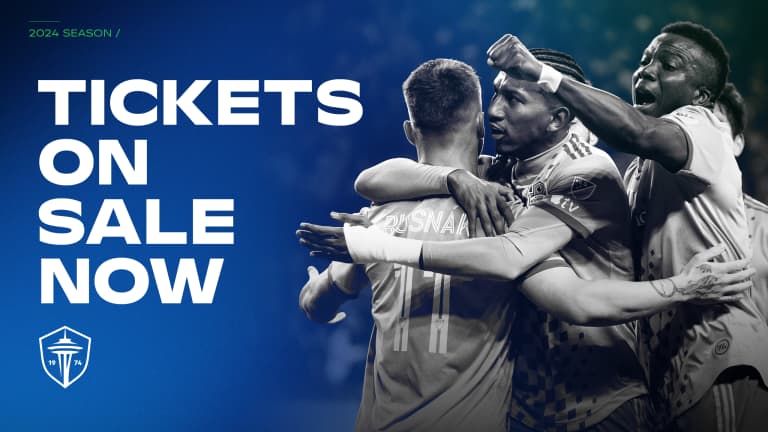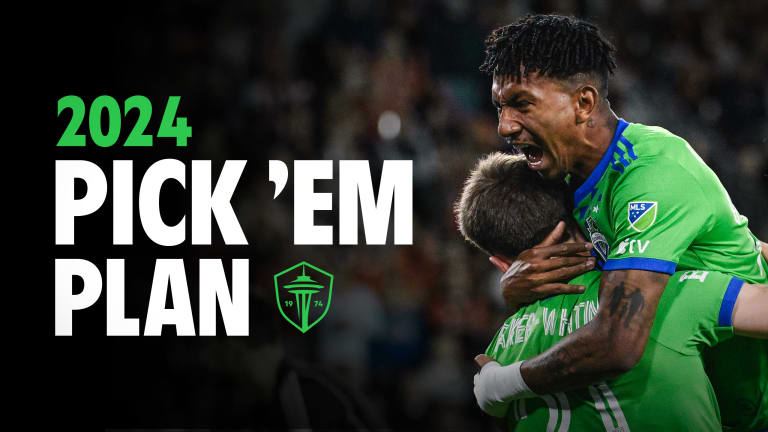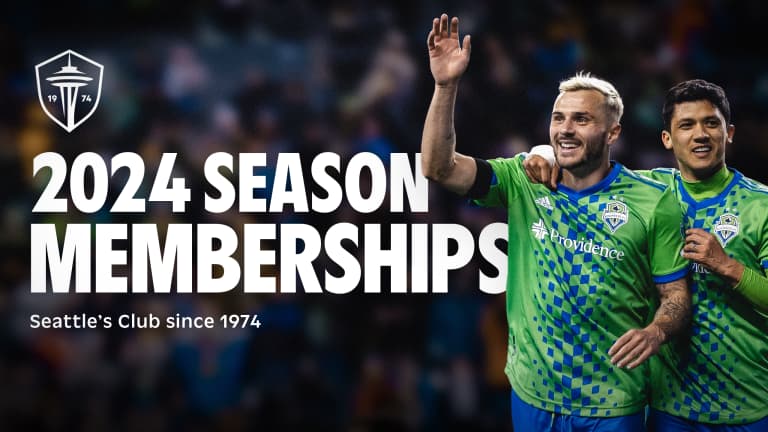Editor's Note: In just three short years, the Seattle Sounders’ investment in the Academy has led to three Youdan Trophy titles, over two dozen players receiving U.S. youth national team call-ups, a wave of teenagers signing pro contracts and a national championship.
This four-part series will trace the history of the last three years under General Manager & President of Soccer Garth Lagerwey, highlighting the initiatives, staffing hires and tectonic shifts in player development that turned Sounders Academy into a sustainable pipeline of elite prospects who will one day put on the iconic Rave Green jersey and play at CenturyLink Field.
Read Part I HERE.
Staffing Hires
When the Seattle Sounders Academy first launched in 2010, the staff was comprised of three coaches. But with an injection of funding in 2015, the club hired several more full-time coaches, whose tasks and responsibilities were more specialized, enabling each coach to focus his or her efforts on specific segments of the professional pathway.
The club hired Wade Webber and Junior Gonzalez as head coaches for the two youngest teams in the Academy. Webber is currently the assistant coach for Sounders FC 2, while Gonzalez left in 2016 to become the head coach of Rio Grande Valley FC and now serves as an assistant for the LA Galaxy.
“We decided pretty early that we were going to professionalize the program,” said Director of Player Development Marc Nicholls. “When we brought in a full-time coach for our U-15 team, which was an important thing to do, we decided to give some dual roles. Junior was the first one that we gave a scouting role to because, as the coach of the youngest team, we thought we could make more informed decisions about the players coming in at the entrance level. He was the first [Academy] scout that the club had hired, and one of the first in MLS.”
Once Gonzalez moved on to RGV, the club brought in Henry Brauner as the Sounders Academy Head and Recruitment, a more specialized role than the one held by his predecessor. This has freed Brauner up to focus his energies on solidifying the club’s expansive talent identification network throughout Washington, establishing a national network of scouts and tracking the progress of hundreds of prospects.
The club also brought on former Sounder Josh Ford as a full-time goalkeeper coach to oversee the development of all the ‘keepers in the system. Since coming on board in 2016, two of the goalkeepers under Ford’s tutelage, Academy alum Trey Muse and U-19 standout Sam Fowler, have established themselves as mainstays on the U.S. youth national team circuit.
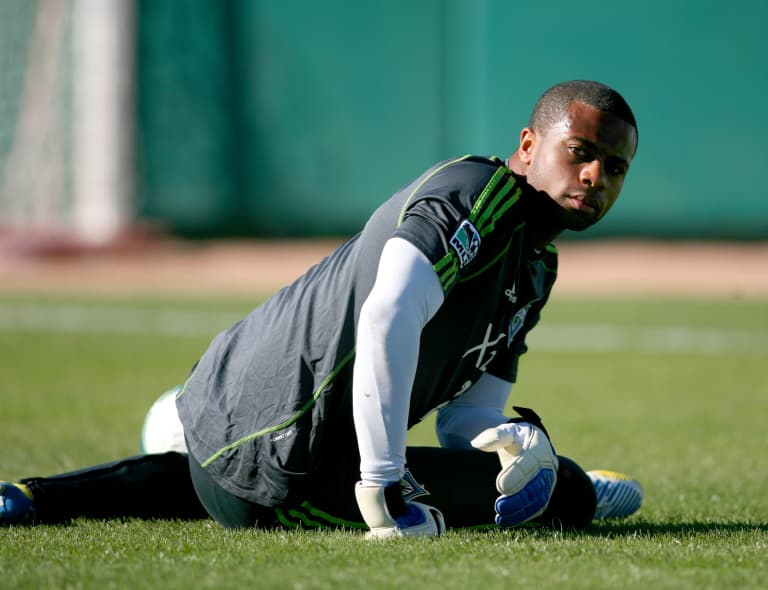
Former Sounders goalkeeper Josh Ford has been instrumental as the Sounders Academy Goalkeeper Coach | Corky Trewin
Director of Soccer Programs Brayton Knapp became the head of Sounders Discovery Program, while Dan Lock was hired to manage the Club Partnerships and Affiliates initiative. After two years at the helm of this program, Lock now serves as the Head Coach of the U-15 team as well.
Sounders Academy also hired a full-time athletic trainer, sports performance coach, a video analyst and a head of education and welfare. In 2018, S2 forward David Estrada was brought on as a part-time assistant coach for the U-15 team.
“The increased investment has meant that we can now have a discovery program and identify and develop young players,” said Nicholls. “It’s meant that we’ve been able to hire someone who can oversee the schooling for players. We’ve been able to bring in Sheila [Tatsunami] full time and make a medical department with some support for her. A full-time goalkeeper coach is something that we never had before, or a full-time scout. What we’ve been able to do is build a well-rounded academy.”
The Academy has also allocated funds toward the development of its own coaches, which has been paramount to the youth system’s success on the national and international stages in recent years.
“I would say the biggest thing from the training curriculum is there’s intent to how the teams play. Nothing is accidental. The way they attack is intentional. The way they defend and press is intentional.” — S2 Assistant Coach former Academy Coach Wade Webber
“The fact that Marc Nicholls, myself and [Academy Director of Coaching and U-17 Head Coach] Chris Little have all completed the Elite Formation Coaching License is a really big deal,” said Sounders FC Head Scout Sean Henderson, who spent seven years as an Academy coach. “It has informed how we are coaching and developing players. If you look at the clubs from MLS that have really taken that French course in and used it, those are the clubs that have made the biggest progress.”
After Nicholls completed the EFCL, the Academy implemented a comprehensive training curriculum for its youth teams, which focuses on developing creative, technical, problem-solving soccer players.
The likes of Sam Rogers, Khai Brisco, Fowler and Dylan Teves were all part of the first wave of players to spend multiple years in the system immersed in the new curriculum.
Game Model, Principles of Play, Game Cues and Positional Profiles
Almost two years ago, Sounders Academy hired Little to revamp the training curriculum and implement a game model, or unified playing style, across the youth teams.
“The DOC is focused on the tactical side of the club, so our curriculum, game model, principles of play, game cues and making sure that’s the foundation for our identity,” said Little. “And then looking at how that translates to the teaching, the coaches implementing this methodology and how we see a consistent style of play.”
According to Webber, who spent 2015-17 as an academy coach, the training curriculum has been one of the biggest game changers in how the Academy develops elite professional prospects.
“I would say the biggest thing from the training curriculum is there’s intent to how the teams play,” he said. “Nothing is accidental. The way they attack is intentional. The way they defend and press is intentional. They work specifically on all of those things in training.”
By employing a unified game model, the players are developed in a system that shares tactical principles with S2 and the First Team, which eases the transition as players progress through the Academy and into the professional ranks.
Instituting a game model and training curriculum has also made the pipeline more sustainable. Last season’s U-17s have rightfully earned plenty of plaudits for their success, but they are not a golden generation, as the players coming up behind them are just as talented, with six players in the 2003-05 age groups receiving USYNT call-ups in the past year.
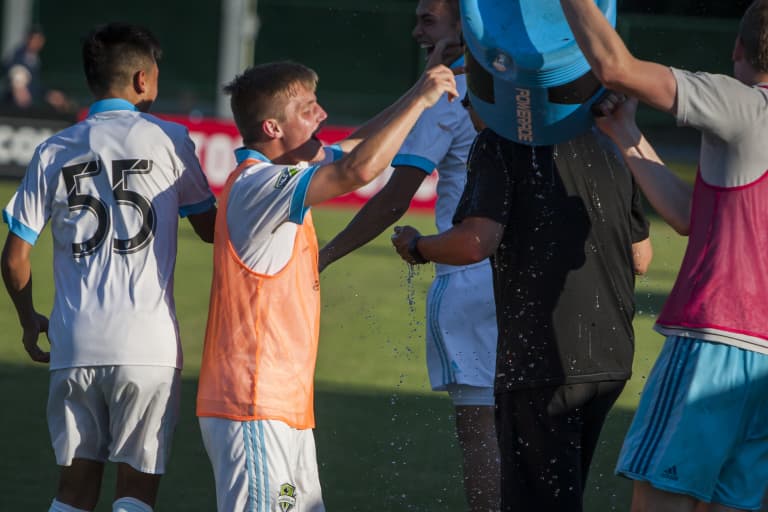
The U-17s celebrate defeating reigning champs Atlanta United 5-1 in the U.S. Soccer Development Academy National Championship match
Having Little oversee the Academy’s tactical identity has amplified the strengths of each individual coach. The coaching staff meets with him once a week to discuss the principles they’re working on in training — building possession from the back, unbalancing opponents’ defensive shape, patterns and combination play, etc. — and the most effective ways to teach players those key constructs.
The Sounders’ game model is further broken down into game cues, or situations that are likely to occur regularly within the flow of a match.
“The game cues include scenarios like playing out of the back against one striker, so what are the different solutions to do that?” Little said. “Unbalancing the defense, what are some of the combinations we can make? We meet weekly as a technical staff and we’ll address these principles. It’s a constantly evolving process where we introduce evidence-based coaching.”
One prominent byproduct of the commitment to evidence-based coaching is the club’s increased vertical integration.
Two years ago, the Academy staff examined a study conducted by City Football Group showing that over 80 percent of players who competed in the knockout rounds of the UEFA Champions League made their professional debuts at 17. This informed the club’s decision to integrate more Academy players into S2, as it accelerates the timeline for talented prospects making their First Team debuts.
Specialization in the Pathway
Having a more specialized, well-rounded staff has allowed the club to tailor its training curriculum to fit the needs of different age groups.
“For us, the foundation is technique and creativity of the player, and game intelligence,” said Little. “So, we focus the SDP and U-15s on technical work, building the technical foundation, so the players are comfortable and have an ability to create in space. As it transitions into the older age groups, we add in more complex situations: playing against one striker, playing against two strikers, unbalancing defenders. At the U-15 level we’re focusing more on the attacking side of the game. As they start to transition into 17s and 19s, we’re teaching them how to defend as well as how to attack.”
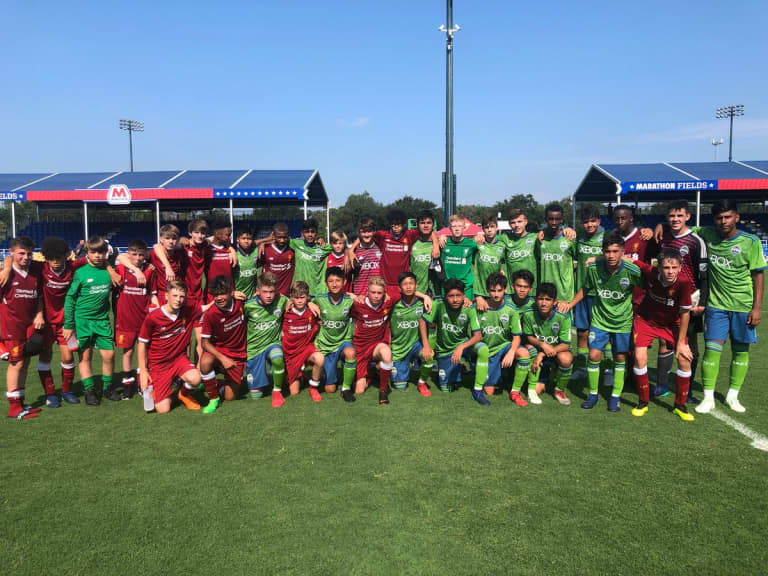
The Sounders Discovery Program U-14s pose with their Liverpool FC counterparts after a 3-1 at the ICC Futures tournament | Lauren Babcock
Within the Academy’s game model, the club has established clear-cut positional profiles for every player on the field, dictating their specific roles within the team’s system. In addition to playing a critical role in player identification in scouting, this has been crucial in accelerating development, as it foments a system of accountability and competition.
After each match, every player is given his positional profile with 8-10 key constructs of his performance.
“We have a performance board in the academy office, and we rank each position based on the respective key criteria, so it shows who is performing best with the key things we’re looking at. We then rate that in comparison with S2 and the First Team, so our players have a goal they’re always trying to reach." — U-17 Head Coach Chris Little
For example, a defensive midfielder’s positional profile in Seattle’s game model will ask the player to rate his performance based on number of interceptions, number of pass attempts, how many times he switched the point of attack and what percentage of his individual defensive duels he won. The player will then be given all the data from the match, supplied by a sports analytics company called Ortec, and will be asked to rate his performance. After he completes this process, he’ll meet with his coaches for individual feedback, as well as to review film from the match.
This approach also breeds competition throughout the Academy.
Added Little: “We have a performance board in the academy office, and we rank each position based on the respective key criteria, so it shows who is performing best with the key things we’re looking at. We then rate that in comparison with S2 and the First Team, so our players have a goal they’re always trying to reach. They might be doing well and at the top of the academy board as a No. 6, but they’re only getting 50 passes a game, whereas Osvaldo Alonso is getting 65. So, they know if they want to make it to the First Team, they have to get more involved, get on the ball more, find spaces better, take better positions as a No. 6. That helps us guide their development, and allows the players to take ownership of it, giving them the right information to learn from.”
This process has led to the development of well-rounded, tactically astute players who truly understand Sounders soccer, increasing the likelihood of being successful at the MLS level.

